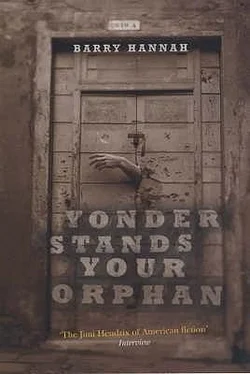MORTIMER AND SIDNEY MET IN THE BAIT STORE AFTER hours. Sidney’s emporium was prosperous now. It needed both Opal and Iona, his new helper. A yellow Lexus sports wagon was parked behind the store. Sidney watched Mortimer with pleasure. Thin, bent, elderly in almost every movement. Pain on his face. The pretty boy home sick from school.
When all was clear, they went out and told the girls to exit the Lexus newly stolen from Sevierville, Tennessee. It was yellow with a cream white grille in front. It was a little girl’s car, in fact.
Mortimer put on a CD in the jambox. The girls had done this before. The music was elvish dancing music that Mortimer had gotten at a bargain in the mall. Nobody had ever bought it. It was a junior college symphony from Kansas.
The orphans, Betsy and Irma, began by holding hands and skipping together in the aisles of the heavily stocked store, knocking over flashlight batteries, sardines, bananas. Since Sidney had restocked, you could see the equipment for much iniquity. Magazines about muscular naked girls.
The girls walked to the tunes and disrobed privately behind a far aisle. They were not certain how to carry on, but the elvish meadow dance music urged them onward, and they came out demurely in nothing. Mortimer cheered them to continue to dance. No hand touched them. It was an arrangement by the artist in his last creative fever.
He and Sidney watched from padded chairs. They shared a single-malt scotch bottle between them. Farté Bait House glasses to drink from. They seemed to desire nothing else; they were not anxious but meditative. Once Sidney accidentally touched Mortimer’s arm reaching for his drink, and Mortimer’s knife hand flew to his back pocket. But there was nothing there, the movement was involuntary.
At the end they gave the girls money and said it was a very fine audition. This was the form of Mortimer’s current sin. Sidney was the more lecherous of the two and had gotten tight enough to hold the shoulder of the child Betsy. But this act was so repellent to her that she almost fainted, so he left her alone to return to the yellow Lexus and home to Clinton, where they had pallets and a large television in a vacant room, with snacks and sodas and their own phone, in Mortimer’s very teenage hangout.
Melanie, Bernice and John Roman ate at the rib house, Near ’Nuff Food. Its theme was medieval chaos, and people dumped buckets of ribs on a tablecloth of butcher paper, then tore off a length from the top and bagged the rib bones in preparation for the next arrivals. It was festive and harsh, and a success. Employees of the bad restaurant ate here.
The face of Frank Booth passed by a window, and Roman was shocked again by the surgeon’s ability to bring a third Conway Twitty into the world. He reached for his big rib knife, a heavy steel thing, and awaited Booth’s appearance at the door.
Booth came in the door, with Ruthna and the very drunk Whit and Alexander. Ruthna was not drinking and looked cleanly figured, getting some of her womanly curves back. Melanie admired her and thought she had seen her around the lake. Bernice was deeply affected by Melanie, who had stayed close to her through the illness even though Roman sometimes had doubts about the lady’s curious goodness. His reservations were gone now. He saw she could not help being a good woman, and he was sorry for her pain as an old lover. He was a happier man now that Bernice was back among the living, but the Booth man hovered near him, and the women noticed him too.
“Is he that singer, or isn’t he?” asked Melanie. “‘A Bridge That Just Won’t Burn’? He’s bald now. Doesn’t he wear a hairpiece when he comes here to eat?”
“That is not Conway Twitty. That is another man who looks like him. And it ain’t right,” said Roman.
“My word. With the woman and her poor drunken friends.” The group of them sat down at a near table. Whit and Alexander had brought brown bags with liquor in them, allowed on dry Sunday evenings.
The bald man with Twitty’s face was paying serious court to Ruthna. He was touching her face and being most solicitous about her hair and comfort as she combed away at a snarl. He seemed to be feeling just capital, but there was an appalling quality to this, seeing a dead singer making time with Ruthna, just back from the dead herself and nearly as pale as her drunkmates. These men had not turned into mean drunks yet, a miracle for the decades they had been lushes. They sweated and carped merrily, waiting on the fat ribs, the cowgirl wenches, the huge fruit-jar glasses with ice and lemon setups. Melanie saw that Ruthna was not as ardent as Booth, but she was not disinterested.
Roman snorted. “Skank.”
“You ain’t the total darling you once were,” said Bernice. His healthy wife. He could hardly believe she was here. Maybe he suffered from Mortimer for her life. That night of the masks. Her pain had seemed to have had no reason, her waiting, his watching. He could not keep his eyes off Booth’s face. He felt lifted from his seat, memory throbbing in his wrist. The thing, as if warned, turned and beheld him directly. Help me , the lips seemed to form.
Roman held his rib knife tensely, poised. The women were scared and jittery now, including Ruthna, who seemed at last to recognize the mask of her date.
Ulrich and Egan were visiting Peden in his house by the junkyard. Peden now had a gun he rested in different rooms. He had reports of Mortimer in good humor, but scrawny, aged. Lloyd drove for him almost always. Edie gave him rubdowns in Clinton and Rolling Fork. She was showing her age too. Maybe she was back on the Valium.
Sponce had only his stepfather Harold’s connection to Peden when they stole the ’48 together. They knew the call for the car was out and that Mortimer intended to hurt somebody about this matter. The boys had not come home at all since their mother’s wedding weeks ago. They might be legal drivers before they were seen again. That or dead in the trunk of their ’48.
Sponce could hardly stay at home with Dee and Harold. He did not understand his own position there anymore. There was no family left, only the marriage, a queer thing that seemed to make his mother weaker and Harold officious, strutting and lecturing Sponce about life, now that he was almost a graduate of the mechanics college.
Sponce became a wanderer with no home and barely a car, only Harold’s old Chevrolet El Camino with its truck bed and car cab. It smelled like very lonely oil men. It looked like their wallets inside. A web of rusted veins ran all about. It had a good engine, but sleeping in it was hard when he quit playing like he was training for the air force. But where could he go?
He went into the orphans’ woods and walked, knowing they were all around him from across the canal around their island fortress, and he held a rifle as if he were an idle hunter of deer, perhaps lost. He sought their company, but he did not know how to acknowledge them. He wanted a confrontation so he could shout out his innocence, but he fled when nobody pursued. He walked himself into a ragged hungry thing. By the time he made it to Peden’s house, he was stunned, sleepy, a scarecrow driving a car from the era of eight-track tapes. But he stumbled onto the porch and held out his hand.
“I come to give myself up.”
“Have a seat, boy.”
“Could I have some of that coffee? I don’t want to put you out.”
“Come on in. We were all having some.”
“I been everywhere. I’m wore out by three counties. But I’m telling what I know.”
“What did you think we wanted to hear?” asked Egan. The boy worried him with his hungry look. “You been looking for your little brothers?”
Читать дальше











